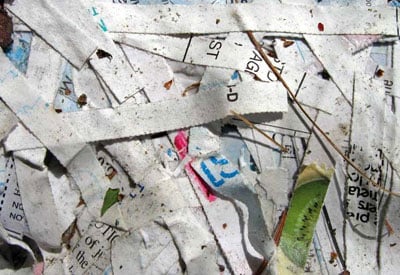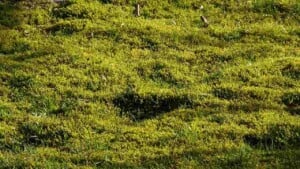In a previous post, we recommended adding paper or cardboard to a compost heap that’s too moist. Paper will absorb water as well as provide short-term air space to aide in circulation if it’s crumpled. That suggestion, as pointed out by one of our more careful readers, brought up an entirely different subject: is composting paper safe? The answer is yes. And no.
Paper — made from wood pulp — seems a likely addition to compost because of its source: nature. Newspapers have long been held as a good source of “brown” component in the brown-green, carbon-nitrogen balance that compost piles need (so much so that adding too much paper will tip the balance). But paper might also contain some harmful ingredients in the form of inks, dyes and other treatments.

FREE SHIPPING!
Compact (88 gal.)
The perfect size for families that generate 2-3 bags of material monthly.
Learn moreConvert kitchen, yard and garden waste into soil-nourishing organic matter with our backyard tested composting bins and supplies. Decreasing household waste and building your soil has never been so easy!
These days, most newspaper inks are soy-based, a good thing for the environment (though the soy used in inks is likely from GMO sources). But some inks may still contain petro-chemicals or pigments if they include color as most papers do. Also newsprint may hold some chlorine from the bleaching process. Newspaper is bleached less than most commercial office papers but may still contain some chlorine. This is a good reason not to compost office paper, mail or magazines. Slick papers of the sort used by magazines are also treated with petro-chemicals, so that they won’t yellow and break down as quickly as newsprint. The best idea is to recycle all white, slick or otherwise treated papers.
But newspapers? Apparently the jury is still out. The Sierra Club’s Mr. Green says there’s a study that newsprint contains less toxic material than straw or grass and is therefore safe to use. He doesn’t cite the study and though we found many references to Mr. Green’s claim, we couldn’t find a study that directly addresses his statement (readers, can you help?). It’s well known that grasses and straw treated with herbicides and other sprays aren’t healthy additions to compost and may even kill some plants (organic farms, lawns, and gardens mean clean grass and straw going into compost). Some composters dismiss the small risk of adding toxins to the pile by including newspaper, arguing that the microorganisms that facilitate the composting process also help break down the toxins. Cornell University’s compost page suggests that the risk of using even glossy paper are minimal. Over at City Food Growers, there’s a good accounting of the risks of using paper in you compost and garden and suggest there’s an easy solution…recycle! There are plenty of things to keep your compost heaps, well, heaping. If you do use newsprint, be sure it’s shredded. If not, it may still be in you pile a year later, impeding good circulation of air and moisture.

A note on cardboard: Modern brown, corrugated cardboard uses neither coloring or glues and is okay to use in compost (or as mulch). Just be sure it’s shredded. White or colored cardboard? Again, some say the risks are small. Personally, your conscientious Planet Natural Blogger wouldn’t use them.











